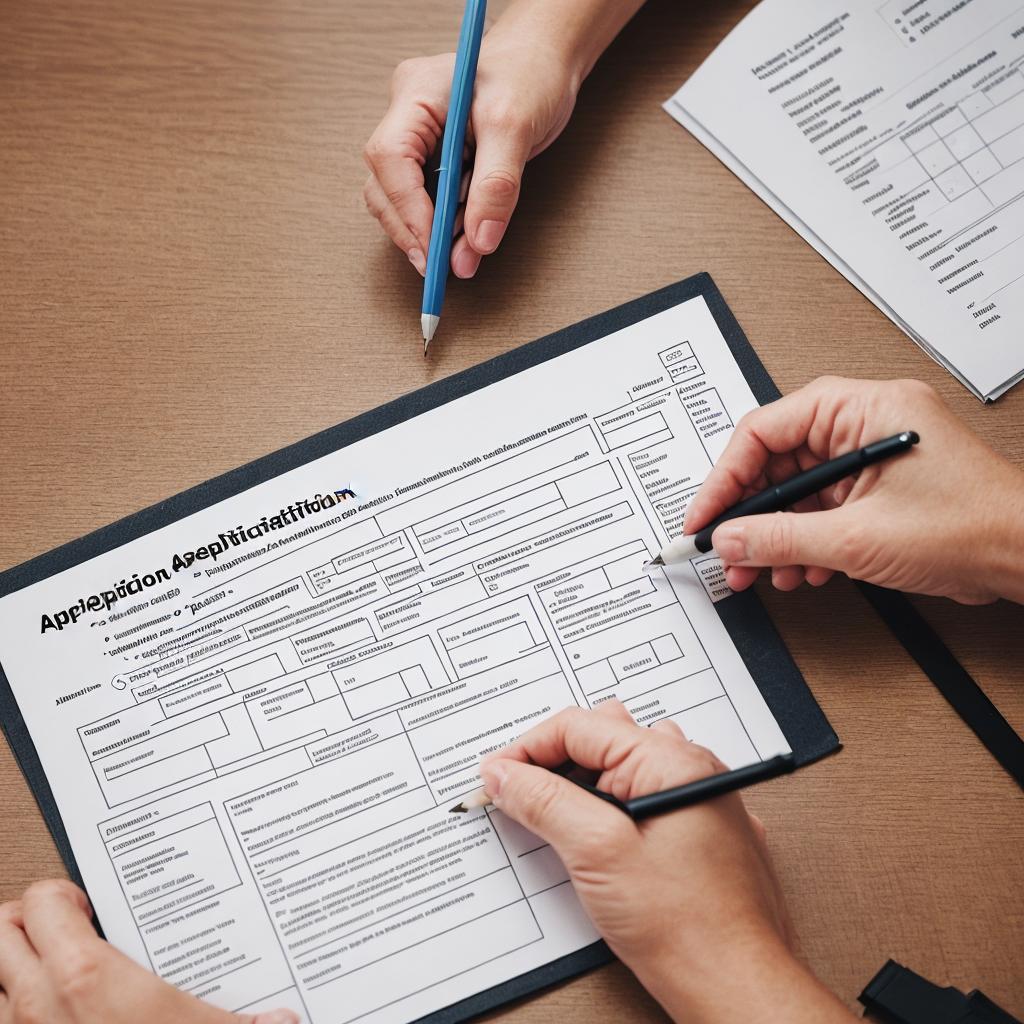8 Best Steps to Navigate Medicaid Application Submission

You’re ready to conquer the daunting task of navigating the Medicaid application submission process, and we’re here to show you the eight best steps to make it a breeze.
- Gather those required documents.
- Understand the eligibility criteria.
- Complete the application form with accurate and detailed information.
- Don’t forget to submit the necessary supporting documentation.
- Follow up on your application.
- Respond to any requests for additional information.
- Seek professional assistance if needed.
Let’s dive in and conquer this together!
Key Takeaways
- Gather all necessary documents such as proof of identity, residency, income, and citizenship/immigration status.
- Understand the eligibility criteria, including income level, assets, and other eligibility factors specific to your state.
- Complete the application form accurately, ensuring all required fields are filled and supporting documents are attached.
- Follow up on your application, regularly checking the status and addressing any issues or delays that may arise.
Gather Required Documents
To successfully navigate the Medicaid application submission process, you need to gather all the required documents. This step is crucial to ensure that your application is complete and accurate. The documents you’ll need to gather include proof of identity, proof of residency, proof of income, proof of citizenship or immigration status, and any other supporting documents required by your state’s Medicaid program.
Proof of identity can include a driver’s license, passport, or other government-issued identification. It’s important to provide a clear and legible copy of your identification document.
Proof of residency can be established by providing a utility bill, lease agreement, or any other official document that shows your current address.
Proof of income includes recent pay stubs, tax returns, or any other documentation that demonstrates your income level. It’s important to include all sources of income, including wages, self-employment income, and any public assistance benefits you may receive.
Proof of citizenship or immigration status includes a birth certificate, passport, or immigration documents. This is required to establish your eligibility for Medicaid.
In addition to these documents, you may also need to provide any other supporting documentation required by your state’s Medicaid program. This could include medical records, proof of disability, or any other relevant information.
Understand Eligibility Criteria
To understand the eligibility criteria for Medicaid, you must review the specific requirements set by your state’s Medicaid program. Each state has its own guidelines for determining eligibility, so it’s important to familiarize yourself with the rules in your state.
Generally, Medicaid is available to individuals and families with low income, but there are other factors that may affect eligibility as well.
One key factor is income level. Medicaid programs typically have income limits based on the Federal Poverty Level (FPL). The FPL is updated annually and varies depending on household size. You’ll need to provide proof of your income, such as pay stubs or tax returns, when applying for Medicaid.
Another factor is assets. Some states have asset limits, which means that you may not be eligible if you have too many assets, such as savings accounts or property. However, certain assets, like your primary residence or a car, may be exempt from consideration.
Other eligibility criteria may include age, disability status, pregnancy, and citizenship or immigration status. It’s important to carefully review the specific requirements for your state to determine if you meet the eligibility criteria for Medicaid. This will help ensure that your application is accurate and complete, increasing your chances of approval.
Complete the Application Form
Fill out the application form accurately and thoroughly to ensure a smooth Medicaid application process. The application form is a crucial step in determining your eligibility for Medicaid benefits.
Here are three important tips to help you complete the form accurately:
- Provide all required information: Make sure to fill in all the necessary fields on the application form. This includes personal details such as your name, address, date of birth, and social security number. Be sure to double-check your information for any errors or omissions.
- Attach supporting documents: In addition to completing the form, you may need to provide supporting documents to verify your eligibility. These documents can include proof of income, residency, citizenship, and any other relevant documentation. Ensure that you gather all the necessary paperwork and attach it to your application.
- Seek assistance if needed: If you have any questions or need help filling out the application form, don’t hesitate to reach out for assistance. Medicaid offices, community organizations, or healthcare providers may be able to provide guidance and support throughout the application process.
Provide Accurate and Detailed Information
When completing the Medicaid application form, it’s essential that you provide accurate and detailed information. The information you provide will determine your eligibility and the benefits you may receive. It’s important to be thorough and organized while filling out the form to avoid any delays or complications in the application process.
Start by gathering all the necessary documents and information beforehand. This may include your identification documents, proof of income, medical bills, and any other relevant documentation. Make sure to double-check the information you provide to ensure its accuracy.
When filling out the form, be as specific and detailed as possible. For example, if you have any medical conditions or disabilities, provide specific information about their nature and the impact they’ve on your daily life. Include any relevant medical records or doctor’s notes to support your claims.
Accuracy is crucial when providing financial information. Be honest and transparent about your income, assets, and expenses. Providing false or misleading information can result in penalties or even legal consequences.
Lastly, review your application thoroughly before submitting it. Check for any errors or missing information. Be sure to sign and date the form, as incomplete or unsigned applications may be rejected.
Submit Supporting Documentation
Gather and include all necessary supporting documentation to ensure a smooth Medicaid application submission process. Here are three essential documents you need to include:
- Proof of identity: Provide a copy of your valid identification, such as a driver’s license, passport, or state-issued ID. This will establish your identity and help Medicaid verify your eligibility.
- Income verification: Include documents that demonstrate your income, such as pay stubs, tax returns, or a letter from your employer. Medicaid needs to assess your financial situation accurately to determine your eligibility for benefits.
- Proof of residency: Submit documents that establish your residency, such as utility bills, lease agreements, or a mortgage statement. This confirms that you reside in the state where you’re applying for Medicaid.
Remember, it’s crucial to organize your documents neatly and ensure they’re legible. If any documents are missing or incomplete, it may delay the processing of your application. Double-check the Medicaid application guidelines to make sure you have included all the required supporting documentation.
Follow Up on Your Application
Make sure to regularly check the status of your Medicaid application to stay informed about its progress. Following up on your application is essential to ensure that it’s processed efficiently and to address any issues or delays that may arise. Medicaid applications can take time to be reviewed and approved, so it’s important to stay proactive and engaged throughout the process.
To start, make note of the date when you submitted your application. This will help you keep track of how long it has been since you applied. Most states have online portals or hotlines where you can check the status of your application. Take advantage of these resources and check regularly for updates.
If you notice that your application has been pending for an extended period or if you haven’t received any communication regarding your application, it’s crucial to reach out to the Medicaid office or your caseworker. They can provide information on the status of your application and address any concerns or questions you may have.
Remember to have all necessary documentation and information readily available when following up on your application. This will help ensure that you can provide accurate and timely information when communicating with the Medicaid office.
Respond to Requests for Additional Information
When applying for Medicaid, it’s important to be prepared for requests for additional information. Providing the necessary documentation and responding in a timely manner is crucial to ensure the smooth processing of your application.
Providing Necessary Documentation
To ensure a smooth process, promptly respond to requests for additional documentation during your Medicaid application submission. Providing the necessary documentation in a timely manner is crucial to avoid delays or potential denials. Here are three important steps to follow when responding to requests for additional information:
- Review the request:
- Carefully read the request for additional documentation to understand what’s being asked of you.
- Take note of any specific forms or supporting documents that need to be submitted.
- Gather the required documents:
- Begin collecting all the necessary documentation requested.
- This may include proof of income, identification, residency, and medical records.
- Make sure to organize them in a clear and organized manner.
- Submit the documents:
- Once you have gathered all the required documents, submit them as soon as possible.
- Follow the instructions provided by the Medicaid office on how to submit the documentation.
- This may include mailing, faxing, or uploading the documents online.
Timely Response Is Crucial
Respond to requests for additional information promptly to ensure a smooth and efficient Medicaid application process. When applying for Medicaid, it is common for the state agency to request additional information or documentation to support your application. Failing to respond in a timely manner can lead to delays or even denials in your Medicaid eligibility determination. To avoid unnecessary setbacks, it is crucial to promptly provide the requested information. By doing so, you demonstrate your commitment to the application process and increase the likelihood of a favorable outcome. Make sure to carefully review the request and gather all the necessary documents before submitting them. Responding promptly shows your dedication to the Medicaid application process and helps to expedite the review and approval process. Don’t let delays in responding to requests for additional information hinder your Medicaid application progress.
| Emotional Response | Description | Example |
|---|---|---|
| Frustration | Feeling annoyed or upset | Waiting for weeks for a response can be frustrating, especially if it leads to delays in accessing necessary healthcare services. |
| Relief | Feeling of comfort or ease | Receiving a prompt response to a request for additional information can provide relief, knowing that your application is progressing smoothly. |
| Anxiety | Feeling of unease or worry | Failing to respond promptly to requests for additional information can cause anxiety, as it may lead to a delay or denial of Medicaid coverage. |
| Satisfaction | Feeling of contentment or fulfillment | Successfully providing the requested information in a timely manner can bring satisfaction, knowing that you are actively working towards obtaining Medicaid coverage. |
Responding promptly to requests for additional information is essential in navigating the Medicaid application process effectively. By doing so, you can minimize delays, increase your chances of a positive outcome, and ensure timely access to the healthcare services you need.
Seek Professional Assistance if Needed
If you’re unsure about navigating the Medicaid application process, consider seeking professional assistance. Applying for Medicaid can be a complex and overwhelming process, and having someone who’s knowledgeable and experienced can greatly increase your chances of success.
Here are three reasons why seeking professional assistance may be beneficial:
- Expertise: Medicaid rules and regulations can be confusing and constantly changing. Professionals who specialize in Medicaid applications are up-to-date with the latest information and can guide you through the process efficiently. They can help you understand the eligibility requirements, gather the necessary documentation, and complete the application accurately.
- Time-saving: Applying for Medicaid requires gathering and submitting a lot of documentation. A professional can help you organize your paperwork, ensure that all necessary documents are included, and submit the application on time. This can save you hours of frustration and prevent delays in the application process.
- Increased chances of approval: Professionals who are familiar with the Medicaid system know what information is crucial to include in your application. They can help you present your case in the best possible light, increasing your chances of approval. They can also assist with any follow-up requests from the Medicaid office, making sure that your application is complete and meets all requirements.
Seeking professional assistance may come at a cost, but the benefits of having an expert by your side can outweigh the expense. It can make the Medicaid application process smoother and improve your chances of getting the assistance you need.
Frequently Asked Questions
What Are the Income Limits for Medicaid Eligibility?
You’ll want to know the income limits for Medicaid eligibility. These limits vary by state and depend on factors such as family size and household income. It’s important to check your state’s specific guidelines.
Are There Any Specific Health Conditions That Automatically Qualify for Medicaid?
If you have specific health conditions, like being pregnant or having a disability, you may automatically qualify for Medicaid. It’s important to check your state’s guidelines to see if you meet the requirements.
Can I Apply for Medicaid Online?
Yes, you can apply for Medicaid online. It is a convenient way to submit your application and ensures faster processing. Visit the official Medicaid website for your state and follow the instructions to complete the online application.
How Long Does It Typically Take for a Medicaid Application to Be Processed?
Medicaid application processing times vary, but it typically takes several weeks. Gather all required documents, complete the application accurately, and submit it promptly. Be patient and don’t worry; they’ll process it as fast as lightning!
What Happens if My Medicaid Application Is Denied?
If your Medicaid application is denied, you should receive a letter explaining the reasons. You can appeal the decision within a certain time frame. It’s important to gather any necessary documentation and follow the proper steps to increase your chances of approval.



